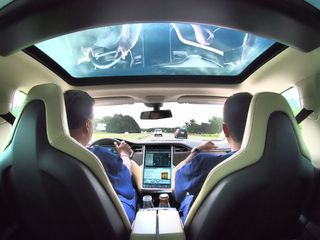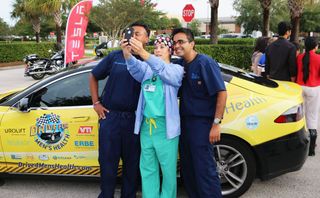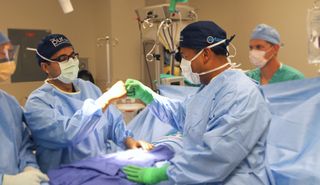
What Will Get Men to Stop Ignoring Their Health? (Video)

Dr. Sijo Parekattil, co-creator of Drive for Men's Health and co-director of The Personalized Urology & Robotics (PUR) Clinic at South Lake Hospital (in affiliation with Orlando Health) contributed this post to Live Science's Expert Voices: Op-Ed & Insights.
It's no secret that most men don't like going to the doctor. I get it. Admittedly, there are times even I avoid it. As men, we like to think of ourselves as strong, resilient and in control. But as a physician, I know the ramifications of what can happen when men put off going to the doctor for too long.
As urologists and co-directors of the Personalized Urology & Robotics (PUR) Clinic at South Lake Hospital in Clermont, Fl., my colleague Dr. Jamin Brahmbhatt and I see the same situation all too often: Men experience symptoms they are too proud or embarrassed to talk about, and by the time they come see us, what once was a very treatable condition turns life-threatening.

This can't wait
Unfortunately, that scenario has been happening for generations. Consider this: In 1920 there was only one year's difference in life expectancy between women and men. Today, women are expected to live five years longer, and one reason may simply be that women make their health more of a priority.
Men are 24 percent less likely than women to go to the doctor and this has likely led to the statistic that men are more likely to die from nine to ten top causes of death in the United States .
Men often ignore behaviors and warning signs that put them at risk for serious diseases. According to the U.S. Centers for Disease Control and Prevention (CDC), men are 25 percent more likely to smoke, even though smoking is strongly linked to four of the top five causes of death in men.
Sign up for the Live Science daily newsletter now
Get the world’s most fascinating discoveries delivered straight to your inbox.
When it comes to heart disease, the leading cause of death, the CDC says that up to 89 percent of sudden cardiac events occur in men, and are often brought on by risk factors that can be managed or avoided altogether.
High LDL cholesterol levels and high blood pressure are significant risk factors for sudden cardiac events. If men would get their recommended routine checks, they would be much more aware of their levels and risk factors and could work with their health care professional to better control them.
The problem is, most men do not make their regular visits to the doctor. These statistics are alarming and the trend has not been in the right direction. We knew that had to change.

Driving the point home
One day last spring, Dr. Brahmbhatt and I were discussing those disparities and trying to come up with ways to get men to be more proactive about their health. We came up with an off-the-wall idea: To drive home the importance of men's health, what if we drove from Florida to New York in just 24 hours, engaging as many men as we could in as many ways as possible?
The idea caught on, and just six weeks later, during Men's Health Week in June, we hit the road in an all-electric Tesla Model S. Men may not care much for going to the doctor, but one thing's for certain — they do love cars.
If men wouldn't come see us to talk about their health, we surmised, surely some would come see this ultra-sleek, state-of-the art machine. We were right.

The numbers don't lie
This month, Harris Poll conducted a national survey of nearly a thousand men across the United States — a survey commissioned and released by Orlando Health, a hospital system affiliated with the PUR Clinic — and found that 81 percent of men could remember the make and model of their first car. Barely half, however, could remember their last trip to the doctor for a check up.
If we are going to get men to make their health a priority, we have a lot of ground to make up.
The first Drive for Men's Health was a huge success. We managed to reach more than 350,000 men through social media. At stops along the way, we held special events to talk about men's health issues, and while we were driving, we hosted webcasts to keep the conversation going. We featured 45 speakers from 16 countries in that 24-hour drive.
This year, we are going even farther. On June 11, we will once again leave Florida heading for New York, but this year, we're also heading west to Los Angeles. We'll make stops in more than a dozen great cities along the way. In all, we'll cover more than six thousand miles and feature more than 250 experts on our 10-day journey. We will talk to health care professionals from all specialties, including urology, cardiology, psychiatry, primary care and many more.
By the time we pull into Los Angeles on June 20, we hope to have reached millions of men and their loved ones with our message, which is simple, but urgent: Make your health a bigger priority, not only for yourself, but for the sake of those who depend on you.
If you want to follow us on our Drive for Men's Health and join the conversation, we'd love to hear from you. Simply go to our website at www.driveformenshealth.com, sign up for our twitter feed @drive4men and send us a message.
Hope to hear from you on the road!
Follow all of the Expert Voices issues and debates — and become part of the discussion — on Facebook, Twitter and Google+. The views expressed are those of the author and do not necessarily reflect the views of the publisher. This version of the article was originally published on Live Science.
